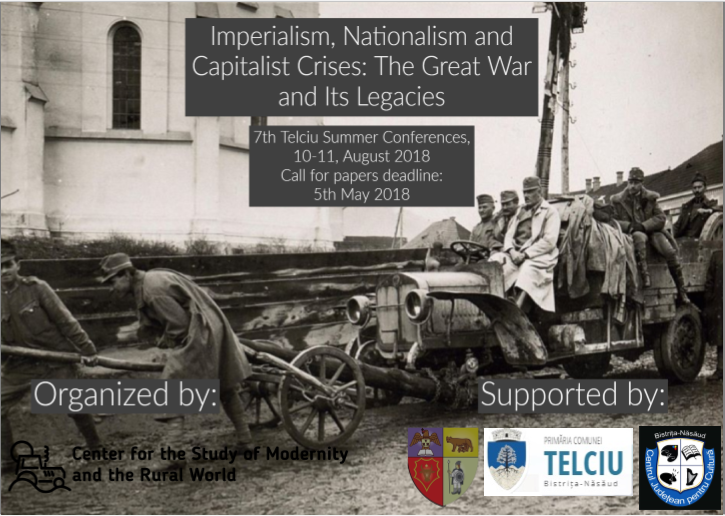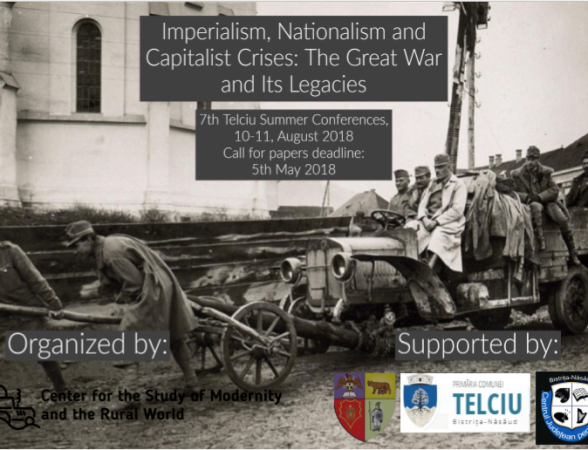
7th Telciu Summer Conferences,
Telciu, 10-11, August 2018
Call for papers deadline: 5th May 2018
What kind of imperialism died in 1918 and what took its place? According to conventional wisdom, the end of the Habsburgs, the official demise of the Ottoman Empire and the replacement of the Tsarist Empire with the USSR marked the end of imperial power relations in Europe. European and American imperialism are viewed as having survived for a few more decades only in Africa, Asia and the Middle East. Instead of Russia and Austro-Hungarian imperialism rose an Eastern Europe of nations judged by the historical canon as too politically immature to handle the ethnic mosaics resulted from defunct empires and too weak to stand up to German and Soviet militarism.
Those who uphold this historical canon obscure more than they reveal. Economic contradictions powered by new sovereignty, mechanisms of neo-imperial economic domination, traumatic population movements in the wake of the Treaty of Versailles, as well as new forms of economic and political violence fueled by anticommunist rhetoric are all left unaddressed in this perspective. Most importantly, this established narrative does not engage in a comparative analysis of the post-imperial situation in East-Central Europe with the post-World War II decolonization experience in Asia, Latin America and the Middle East. Postcolonial studies, intended as a critique of this historical canon, have themselves for a long time focused on Western European imperialisms and their afterlives and have neglected both the study of non-European empires and the spaces between various European and non-European empires.
The conference aims to fill in these gaps and reexamine the basis on which comparative research on imperialism and the legacies of the Great War rest. It calls for complementary comparative work and invites papers that deal with various parts of Eastern Europe as spaces of inter-imperiality (Laura Doyle) where imperial powers overlapped. How do economic, political and social structures become legible in relation to multiple, conflicting empires generating different and competing imperialisms? How did the imperial difference (Madina Tlostanova) between traditional empires shape national, religious, and ethnic self-understandings and the resulting conflicts? How did multi- and inter-imperial relations impact the integration of these spaces into the capitalist world-economy?
To apply for the conference, please submit a title and an abstract of your paper (max 300 words) in English to telciuconferences@gmail.com until 5th of May 2018. Romanian scholars are requested to send the abstract also in Romanian. We will inform you about our decision by the 15th of May, 2018. The organizers will cover meals for the speakers as well as free accommodation for maximum 6 speakers, based on need and by request. Independent researchers or junior researchers will be given priority with accommodation.
There are no fees for the conference participants.
Organizing Committee:
-
Manuela Boatcă, Albert-Ludwigs-Universität, Freiburg, Germany/ Center for the Study of Modernity and the Rural World, Telciu, Romania
-
Madina Tlostanova, Linköping University, Sweden
-
Ovidiu Țichindeleanu, IDEA arts+society, Cluj, Romania/Center for the Study of Modernity and the Rural World, Telciu, Romania
-
Cornel Ban, City University of London, UK/Copenhagen Business School, Dennmark/ Center for the Study of Modernity and the Rural World, Telciu, Romania
-
Valer Simion Cosma, Research Innovation Foundation, Bucharest, Romania/Center for the Study of Modernity and the Rural World, Telciu, Romania
-
Alina Branda, Babeș-Bolyai University, Cluj, Romania/ Center for the Study of Modernity and the Rural World, Telciu, Romania
-
Anca Pârvulescu, Washinghton University, St. Louis, US
-
Julia Roth, Centre for Inter-American studies, University of Bielefeld, Germany
-
Norbert Petrovici, Babeș-Bolyai University, Cluj, Romania/ Center for the Study of Modernity and the Rural World, Telciu, Romania
-
Bogdan Vătavu, Center for the Study of Modernity and the Rural World, Telciu, Romania
-
Theodor Constantiniu, Center for the Study of Modernity and the Rural World, Telciu, Romania
-
Ágota Ábrán, Research Innovation Foundation, Bucharest, Romania/Center for the Study of Modernity and the Rural World, Telciu, Romania
Organized by the Center for the Study of Modernity and the Rural World (CSMLR, Telciu, Romania)
Funded by Telciu City Hall and Village Council & Bistrița-Năsăud County Center for Culture
more details: https://telciusummerconferences.wordpress.com/

